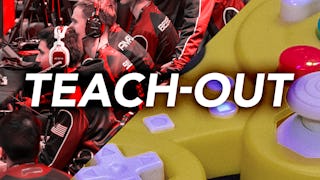Before you can have an Esport, you must have a video game to play and a game developer to design it. This course is dedicated to discussing game developers and their relationship with their respective Esport. The content will help you recognize the qualities a video game must have to become a successful Esport. We will examine the diagram demonstrating the various competitive structures commonly found in Esports.

Enjoy unlimited growth with a year of Coursera Plus for $199 (regularly $399). Save now.

Game Developers and Esports Organizations
This course is part of Esports Specialization

Instructor: Stephane Muller
8,813 already enrolled
Included with
(210 reviews)
Skills you'll gain
Details to know

Add to your LinkedIn profile
See how employees at top companies are mastering in-demand skills

Build your subject-matter expertise
- Learn new concepts from industry experts
- Gain a foundational understanding of a subject or tool
- Develop job-relevant skills with hands-on projects
- Earn a shareable career certificate

There are 2 modules in this course
Before you can have an Esport, there must be a video game to play and a game developer to design it. This week is dedicated to discussing game developers and their relationship with their respective Esport. I also created some content for you to get a better idea of what qualities a video game needs to have to be a successful Esport and the competition structure of a variety of esport genres.
What's included
2 videos5 readings1 peer review1 plugin
Just like sports have professional teams, Esports also have their own professional organizations. The goal of these organizations is to become a successful business that not only tries to win, but takes care of its professional players while at the same time trying to create a brand identity that the audience can relate to. We'll be covering what goes into making an Esports organization successful, which includes branding, structuring the organization, funding sources, and more.
What's included
1 video6 readings1 peer review
Earn a career certificate
Add this credential to your LinkedIn profile, resume, or CV. Share it on social media and in your performance review.
Instructor

Offered by
Explore more from Leadership and Management
 Status: Free Trial
Status: Free TrialUniversity of California, Irvine
 Status: Free Trial
Status: Free TrialUniversity of California, Irvine
 Status: Free Trial
Status: Free TrialUniversity of California, Irvine
 Status: Free
Status: FreeUniversity of Michigan
Why people choose Coursera for their career




Learner reviews
210 reviews
- 5 stars
76.19%
- 4 stars
14.28%
- 3 stars
3.33%
- 2 stars
1.90%
- 1 star
4.28%
Showing 3 of 210
Reviewed on Sep 5, 2021
Great introduction course into the Esports scene. Informative and engaging.
Reviewed on May 9, 2020
Great course to get you introduced to the industry of esports. Not too content heavy for an intro course but gets you thinking about the various aspects to be successful in esports.
Reviewed on Aug 12, 2019
great content presented in a logical progression with immediately useful application in the real world!

Open new doors with Coursera Plus
Unlimited access to 10,000+ world-class courses, hands-on projects, and job-ready certificate programs - all included in your subscription
Advance your career with an online degree
Earn a degree from world-class universities - 100% online
Join over 3,400 global companies that choose Coursera for Business
Upskill your employees to excel in the digital economy
Frequently asked questions
To access the course materials, assignments and to earn a Certificate, you will need to purchase the Certificate experience when you enroll in a course. You can try a Free Trial instead, or apply for Financial Aid. The course may offer 'Full Course, No Certificate' instead. This option lets you see all course materials, submit required assessments, and get a final grade. This also means that you will not be able to purchase a Certificate experience.
When you enroll in the course, you get access to all of the courses in the Specialization, and you earn a certificate when you complete the work. Your electronic Certificate will be added to your Accomplishments page - from there, you can print your Certificate or add it to your LinkedIn profile.
Yes. In select learning programs, you can apply for financial aid or a scholarship if you can’t afford the enrollment fee. If fin aid or scholarship is available for your learning program selection, you’ll find a link to apply on the description page.
More questions
Financial aid available,
¹ Some assignments in this course are AI-graded. For these assignments, your data will be used in accordance with Coursera's Privacy Notice.

